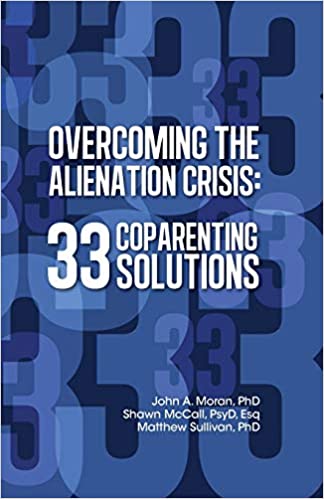Available here on Amazon.
Overcoming the Alienation Crisis: 33 Coparenting Solutions
A companion to our Overcoming the Coparenting Trap: Essential Parenting Skills When a Child Resists a Parent by Dr. John Moran, Tyler Sullivan and Dr. Matthew Sullivan
“Overcoming the Alienation Crisis: 33 Coparenting Solutions is an informative and exquisitely practical guidebook, and companion to Overcoming the Coparenting Trap, both designed to assist family justice professionals and parents experiencing high-conflict coparenting and parent-child contact problems. Part One provides a cogent framework for parents to understand conflict dynamics and resist- refuse problems and serves as key educational scaffolding to promote change and healing. Parts Two and Three elucidate extremely hands-on solutions to frequently occurring parenting and coparenting dilemmas. Both handbooks are indispensable resources for professionals and parents as they work toward resolving conflicts, improving overall child adjustment, repairing parent-child relationships, and augmenting parenting and coparenting functioning. I use the first handbook routinely with parents towards resolving parenting challenges, coparenting conflicts and parent-child contact problems. I am certain this new publication will be another staple in my practitioner toolkit!”
—Barbara Jo Fidler, Ph.D., co-author of Children Who Resist Post-Separation Parental Contact: A Differential Approach for Legal and Mental Health Professionals
Overcoming the Alienation Crisis is a must-have resource for professionals and parents wanting to restore parent-child relationships. Psychologists Moran, McCall, and Sullivan present a balanced view of alienation, coparenting conflict dynamics, and parent-child resist refuse problems. Drawing on decades of experience as clinical forensic experts with family court cases, they drill down into the everyday challenges and dilemmas parents face when a child resists or refuses contact with a parent.
Coparents will find hands-on solutions, strategies, and tips for 33 coparenting problems and predicaments such as:
- Your child believes horrible, slanderous things about you
- Your child refuses to go to their other parent’s home
- Your child refuses calls, texts, and gifts from you
- Your child says they don’t want to be around their new stepparent
Within these pages,you will discover new understandings about why parent-child contact problems are so difficult to resolve, and a compass for moving beyond high conflict into family peacemaking.
Why Read this Book?
Simply put, an alienation crisis is a malignancy for any family. The parent-child contact problem must be managed. Going to court is what you do when you’re down to nothing but bad choices. Our central concern is the emotional damage to children that accumulate from parent-child contact problems. Of course, parents worry about their child and want the parent-child contact problem to end. We hope this book helps parents to better understand and navigate the painful choices that confront the family in the wake of refusal, alienation, and justified rejection.
Why an Alienation Crisis?
- Alienation occurs when a child has previously had a reasonably good relationship with a parent, and the reasons the child states for resisting the parent are unjustified or unreasonable, given the parent’s behavior or relationship history with the child.
- The cause of the alienation crisis is usually a complex pattern of interactions among many people over time, not simply the alienating behavior of one parent.
- Usually allegations of alienation are too simple an answer for a complicated problem.
- Alienation is a family issue. It arises in response to the behavior of family members, extended family, family friends, and experts called in to help the family.
- To protect the children, the coparents need to override their tendency to focus on their coparent’s flaws.
- The truth is, there is plenty of blame to go around. Each family member has contributed to the parent-child problem in one way or another, and to one degree or another, must make changes to resolve it.
- Divorce itself does not harm children. Most children are resilient to the stress of divorce.
- The effects of divorce conflict on children are usually invisible, slow growing, and hard for parents to detect.
- Every child has a part of each parent in them. A central task of the developing child and young adult is to recognize and integrate the good and bad aspects of each of their parents.
- Parent-child contact problems are intractable when they persist, and worsen in spite of multiple attempts to resolve them.
- The important point about intractable problems is that although they are difficult and may not yield to a total “cure,” these problems are not hopeless. And, they can and need to be managed.
We hope this book, with its discussion of causes of and explanations of parent-child contact problems where a child is resisting or refusing contact with a parent and the practical coparenting nuts and bolts can begin to help your family manage your crisis.
“Whether the issue is called alienation, resistance, refusal, or estrangement, this family situation is a crisis calling for compassion and good advice. Authors Moran, McCall, and Sullivan draw on decades of professional experience with families who experience crises in parenting relationships to provide empathy and sound counsel. By examining the problem, exploring solutions, and offering strategies to parents, Overcoming the Alienation Crisis explains all aspects of this family dynamic, including how and why this critical problem must be managed, and why court systems today are ill-equipped to provide solutions.”
—Annette T. Burns, J.D., Phoenix, Arizona; past President, Association of Family and Conciliation Courts
